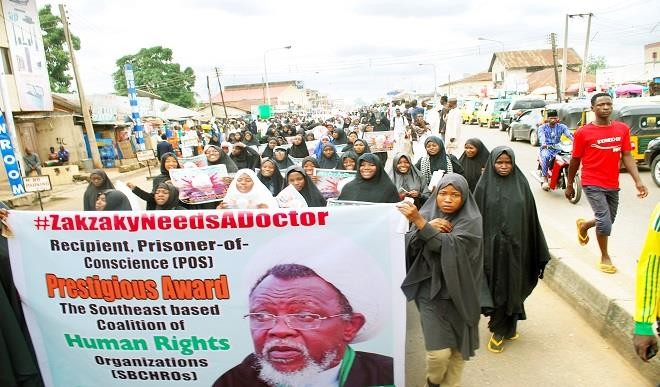
Largely overlooked by the Western media, there is an escalating conflict between Nigeria’s Shia minority, some of whom are organized into the Islamic Movement of Nigeria (IMN), and Nigeria’s secular government. The current focus is eight charges of murder brought by Kaduna state against IMN leader Ibrahim el-Zakzaky, whom the government has detained for two years without charge.
Complicating the issue is the Iranian government, which has periodically protested el-Zakzaky’s confinement. Beginning in April, there have been daily protests in Abuja and cities in the north against el-Zakzaky’s continued detention. According to the Nigerian media, some of these demonstrations have turned violent and the capital has occasionally been “shut down.” The demonstrations may have provoked the Kaduna state authorities to formally charge el-Zakzaky with murder; if convicted, he could face the death penalty. Federal, not state, authorities, are holding El-Zakzaky in custody, and federal spokesmen have said that he cannot be released until the Kaduna state judicial process is completed.
The murder charges stem from an incident in Zaria in December 2015. Federal and military spokesmen say that a Shiite mob led by el-Zakzaky attempted to assassinate Nigeria’s chief of army staff Tukur Buratai when they blocked his convoy. Buratai was not killed, but the formal charges against el-Zakzaky accuse him and his followers of killing at least one soldier by name. In the aftermath, the army attacked IMN facilities, killing hundreds of people, including members of el-Zakzaky’s family. El-Zakzaky and his wife were seriously wounded in the attack and subsequently arrested. IMN vociferously denies that there was any assassination attempt, and charges the army with attempting to disrupt a Shia religious event. The Zaria episode is in some ways similar to the 2009 clash between the army and followers of Mohammed Yusuf in Maiduguri, which led to Yusuf’s death and to the emergence of Boko Haram in its present form. But unlike Mohammed Yusuf, el-Zakzaky has not been murdered by the police. Indeed, the Abuja government claims that he and his wife have received excellent medical attention. Further, Mohammed Yusuf advocated violence against the secular state, while el-Zakzaky has not.
Advocacy of violence aside, there are striking ideological similarities between IMN and Boko Haram, at least for outside observers. Both see the secular state as evil, both want an Islamic state based on Islamic law, and both want the end to Western influence, including in education. Both also seek the end of northern Nigeria’s traditional political and religious elite. For IMN, the model appears to be the aspirations of the post-revolutionary Iranian Islamic state. Boko Haram’s vision appears more nebulous and less developed, but both try to function as a state-within-state.
Despite their similarities, the two groups are anathema to each other. IMN is opposed to Boko Haram’s use of violence and el-Zakzaky has claimed, implausibly, that it is a creation of the “oil-hungry west.” Boko Haram is hostile to any Muslim group that does not share its theology or submit to its authority. As with other Sunni radical movements in the Middle East, Boko Haram is especially hostile to Shias. In the majority-Sunni north of Nigeria, the group likely has more support than do Shias, and the traditional Islamic establishment, which is Sunni, is viscerally hostile to Shias. It is therefore highly unlikely that its members have ever provided any support for the Shia and IMN. The extent of Iranian financial and other support for the Nigerian Shia in general and IMN in particular, however, is unknown.
Nobody really knows the size of the Shiite population in Nigeria. International Crisis Group cites an estimate that it makes up between 2 and 3 percent of Nigeria’s population, which would amount to roughly four million Nigerian Shiites. El-Zakzaky has claimed to have followers ranging from a few hundred thousand to three million; it is worth noting that it is by no means true that all Shias are associated with IMN. Whatever IMN’s numbers, it has demonstrated the ability to shut down Abuja, if only for a few days at a time. Were el-Zakzaky to be tried, convicted, and executed-the worst-case scenario-Abuja could very well face the “black swan” of a Shiite insurrection.
Mr. Campbell is the Ralph Bunche senior fellow for Africa policy studies at the Council on Foreign Relations in Washington, DC. He is the author of Nigeria: What Everyone Needs to Know, which will be published in July 2018. From 1975 to 2007, Campbell served as a U.S. Department of State Foreign Service officer. He served twice in Nigeria, as political counselor from 1988 to 1990, and as ambassador from 2004 to 2007.

 Join Daily Trust WhatsApp Community For Quick Access To News and Happenings Around You.
Join Daily Trust WhatsApp Community For Quick Access To News and Happenings Around You.


